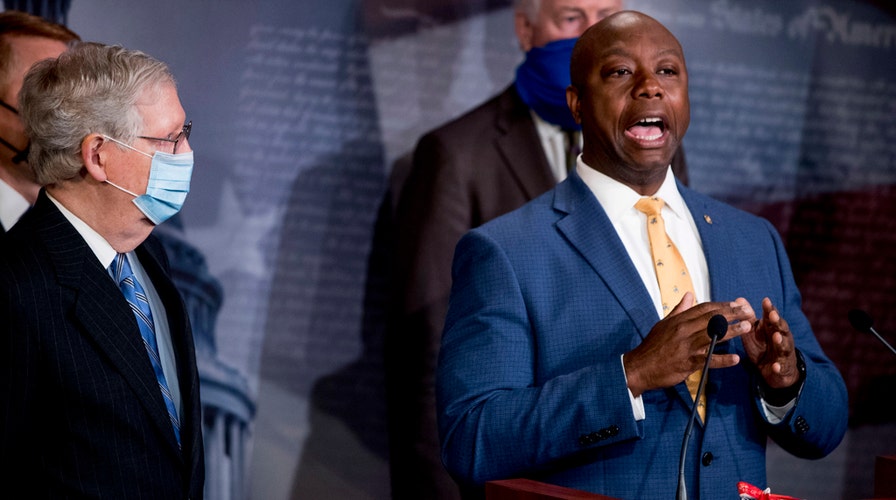Fox News Flash top headlines for June 17
Fox News Flash top headlines are here. Check out what's clicking on Foxnews.com.
Senate Republicans on Wednesday unveiled their "Justice Act" police reform legislation to hold officers accountable.
Sen. Tim Scott, the lone African-American GOP senator, spearheaded the legislation in the wake of George Floyd's death and nationwide protests demanding racial justice – including calls from activists to dismantle police departments. He framed the legislation as a bridge between law enforcement and communities of color.
The Senate bill came after last week Democrats in the House revealed their own "Justice in Policing Act."
Here's what's in the Republican bill:
Chokeholds discouraged, disincentivized
The bill would discourage chokeholds by withholding federal grants from departments that allow for such deadly restraint. President Trump released an executive order Tuesday that would ban chokeholds except in life-threatening situations.
Increased data collection on use of force
The bill states that currently only 40 percent of law enforcement officers contribute to the FBI National Use of Force Data Collection, and there is no official system for tracking police shootings. Under the Justice Act state and local governments would be required to report to the FBI any use of force by a law enforcement officer that causes injury and any discharge of a firearm.
Increased records retention
The bill would require law enforcement agencies to maintain employment and disciplinary records of law enforcement officers for 30 years and to review records as a part of the hiring process.
“No-knock” warrant tracking
The bill would establish the “Breonna Taylor Notification Act” to track no-knock warrants to analyze their intent and their effectiveness. Such warrants used to be rare, but Taylor, 26, was killed after police in Kentucky used a no-knock warrant to enter her Louisville home.
Make lynching a federal crime
While largely symbolic, Congress has sought to make lynching a federal crime for decades, since other types of murder are usually prosecuted at the state and local levels.
Increasing penalties for false police reports
The bill would impose harsher penalties on officers who falsify police reports. It would add a new criminal penalty for falsifying reports in connection to civil rights violations that result in serious injury or death, imposing a maximum 20-year sentence.
Enhanced funding for body cameras
Through a federal grant program, the DOJ would match investments into body cameras worn by police officers, authorizing $100 million each year between 2021 and 2025. The program would impose financial penalties if officers do not use the cameras properly.
SEN. TIM SCOTT HITS BACK AT DURBIN FOR COMPLAINING OF 'TOKEN' APPROACH TO POLICE REFORM
Study on the social status of black men and boys
The bill would commission a study long sought by House Speaker Nancy Pelosi that would go beyond police brutality, looking at education, health care, financial status and crime.
Funding for training on alternative uses of force, de-escalation and duty to intervene
The bill would create a standardized curriculum to train in alternative uses of force and responding to behavioral health crises and publicly list law enforcement agencies that mandate this training. It would also establish and provide funding for a program to train officers to know when to intervene if they see their colleagues abusing their use of force.
Banning sexual abuse by law enforcement
The bill would close a law enforcement consent loophole to ban officers from sexually abusing the individuals they arrest, and track reports of sexual abuse by law enforcement officers to be reported to Congress after one year.
CLICK HERE TO GET THE FOX NEWS APP
African American history museum to train law enforcement on the history of racism
The bill would fund an education program for the Smithsonian’s National Museum of African American History and Culture to create a law enforcement training program on the history of racism in the U.S.













































